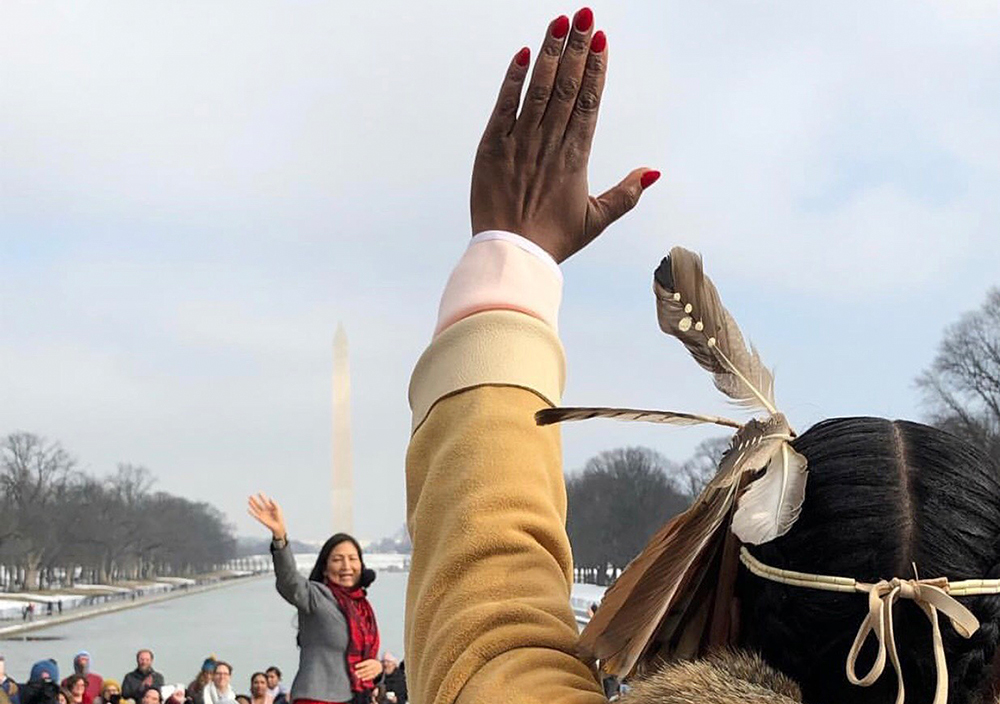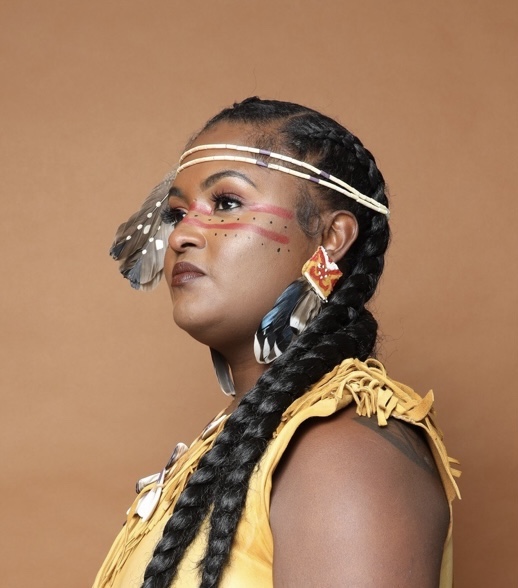
- Details
- By Chez Oxendine
- Indigenous Entrepreneurs
SOUTHAMPTON, N.Y. — Chenae Bullock believes that when a tribal member succeeds, so does her tribe.
That philosophy led Bullock to leverage her 15 years of experience in cultural and heritage preservation and start her own company, Moskehtu Consulting, in February 2019.
 Chenae Bullock, Moskehtu ConsultingSince then, Moskehtu Consulting has delivered consultation on issues ranging from Native sacred site preservation to Indigenous archaeology and dramaturgy. Bullock’s services include speaking engagements, museum curation, cultural competency training and research, as well as corporate diversity training.
Chenae Bullock, Moskehtu ConsultingSince then, Moskehtu Consulting has delivered consultation on issues ranging from Native sacred site preservation to Indigenous archaeology and dramaturgy. Bullock’s services include speaking engagements, museum curation, cultural competency training and research, as well as corporate diversity training.
“I’m an activist, entrepreneur and traditional Indigenous woman, and it’s very hard to balance that when you work for a corporation that isn’t contributing to the sustainability of your tribe,” Bullock (Shinnecock Indian Nation) told Tribal Business News. “Tribal nations are as strong as their individuals. If I do everything I can to sustain myself and contribute to the sustainability of my tribe and the nation, that’s what I’m going to do.”
Bullock said Moskehtu Consulting contributed to her tribe’s well being through improving public relations and building connections to resources, such as fundraising. For example, Moskehtu recently donated $10,000 to the Grave Protection Warrior Society, a New York-based organization dedicated to preserving burial sites.
“The more business owners that do that, the stronger our tribe is going to be,” she said.
‘POWERFUL VOICE’
In addition to her work with Moskehtu, Bullock currently serves as the managing director of Little Beach Harvest, the Shinnecock Nation’s burgeoning cannabis enterprise, and has served as a tribal alternate for the tribe at the Mid-Atlantic Committee on the Ocean, which aims to foster multi-agency collaboration around the ocean’s ecosystem and economy.
Todd Bergeron, managing partner for tribal cannabis development firm Conor Green Consulting LLC, has been working with Bullock on Little Beach’s progress into the cannabis industry. Bergeron described his colleague as “fascinating.”
“She’s a dynamic, powerful voice for Natives, as well as minorities in general,” Bergeron said.
Bullock describes herself as a mogul, carefully balancing multiple hats and duties as she works to improve both her and her tribe’s lot.
“I do it like any other mogul: I compartmentalize, I categorize. I have a very tight schedule. I have a very organized, clean schedule,” she said.
FORCED TO INNOVATE
Bullock’s path to individual — and therefore tribal — success has been a winding one through multiple fields and professions. Her career has traveled through managerial and marketing positions as well as professional work with museums such as the Shinnecock Museum and Cultural Center in New York, Plimoth Plantation in Massachusetts, and the Mashantucket Pequot Museum and Research Center in Connecticut.
It was a drive to take that museum work and that love for her culture further that led Bullock to launch Moskehtu Consulting.
“I felt that I didn’t really need a Ph.D. to be an expert in who I am, so I decided to create my own firm that could service places like museums, tribal governments, non-tribal business and organizations around understanding the importance of creating cultural and heritage preservation,” she said. “I’ve been doing this kind of work over years and I felt it was time to start the business.”
The entrepreneur has found success with Moskehtu. For example, in late 2020, Bullock fielded numerous requests for remote speaking engagements on Native issues and history.
“Between Indigenous People’s Day in October to mid-December, you begin to see a huge demand for Native Americans. November was back to back, I was able to be in 10 different places in one day, almost,” Bullock said. “I was able to give lectures and be keynote for a ton of different colleges in their Native American Heritage Month annual series. I’ve done a lot of different high schools. I was able to do an awesome presentation for a homeschooled kindergartener. I’ve been able to do genealogy consulting, and diversity and inclusion workshops.”
Business slowed down somewhat during the spread of COVID-19, but Bullock focused on driving Moskehtu with remote work.
“It has slowed things down, because my business isn’t quite event based, but I had a lot of things lined up that we’ve had to postpone,” Bullock said. “Just because business is bad doesn’t mean we get out of it. I just had to get really innovative, but I also know there’s a dire need for my services.”
Bullock hopes to continue scaling up Moskehtu in 2021. While her firm employs a range of consultants, she hopes to expand the company’s home office team and establish individual account management.
“I would be able to hire a full back office team, as well as account managers over a particular account — someone who can really make sure we’re upholding everything the client needs,” Bullock said. “I’ve been preparing so eventually when that time happens I will have a solid team.”
Bullock anticipates being able to realize her growth plans this year, unless the pandemic stretches too far into 2021.
“If the pandemic is still spreading, it’s going to be really challenging to see what that scale is going to look like,” she said. “But I’m very optimistic. I don’t see anything trying to get in my way.
“I’m doing the work I was put here to do, and it’s on purpose that I have this business.”
‘BENEFICIAL TO THE WORLD’
Part of Bullock’s services stem from her perspective as a Native American and African American woman, standing at the intersection of several cultures. Through Moskehtu, Bullock provides cultural competency training and diversity consultancy, helping companies improve their relationship with minority employees and minority-owned businesses.
“If we do business [with other businesses] over 100-200 times a year, how many of those businesses are women, are African American, and are Native American? If none of those boxes check off, it’s time to take a look at what you’re doing,” Bullock said. “I’m able to uniquely provide this ‘something else’ perspective into some of those other intersectionalities.”
Those minority perspectives are more important than ever, Bullock said. As cultural norms shift and Indigenous people continue stepping into bigger and more diverse spaces, their voices become crucial to the ongoing conversation about equality and prosperity, Bullock said.
Indigenous people looking to enter the business world, therefore, should strike while the iron is hot, she said.
“I think it’s important for people to tap into who they are, and to treat who they are as beneficial to the world,” Bullock said. “Create your own platform that pretty much allows that platform to be an inspiration for other people. We need it.
“That’s the template that I used and I’m following and it works.”
